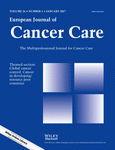Preliminary validation and reliability of the Short Form Chronic Respiratory Disease Questionnaire in a lung cancer population
Abstract
The Short Form Chronic Respiratory Questionnaire (SF-CRQ) is frequently used in patients with obstructive pulmonary disease and it has demonstrated excellent psychometric properties. Since there is no psychometric information for its use with lung cancer patients, this study explored its validity and reliability in this population. Forty-six patients were assessed at two time points (with a 4-week interval) using the SF-CRQ, the modified Borg Scale, five numerical rating scales related to Perceived Severity of Breathlessness, and the Hospital Anxiety and Depression Scale. Internal consistency reliability was investigated by Cronbach's alpha reliability coefficient, test–retest reliability by Spearman–Brown reliability coefficient (P), content validity as well as convergent validity by Pearson's correlation coefficient between the SF-CRQ, and the conceptual similar scales mentioned above were explored. A principal component factor analysis was performed. The internal consistency was high [α = 0.88 (baseline) and 0.91 (after 1 month)]. The SF-CRQ had good stability with test–retest reliability ranging from r = 0.64 to 0.78, P < 0.001. Factor analysis suggests a single construct in this population. The preliminary data analyses supported the convergent, content, and construct validity of the SF-CRQ providing promising evidence that this can be a valid and reliable instrument for the assessment of quality of life related to breathlessness in lung cancer patients.




